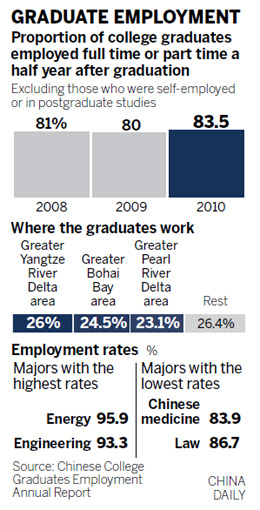Grads leaving big cities for lower living costs
 |
|
Grads leaving big cities for lower living costs |
More than 22 percent of college graduates choose to leave Beijing, Shanghai and Guangzhou after three years of toiling in those megacities, where the opportunities are becoming scarcer.
Of the graduates who move elsewhere, those who make fewer than 2,000 yuan ($309) a month or more than 9,000 yuan a month are the most likely to go, according to the Chinese College Graduates Employment Annual Report (2011), which was released on Thursday in Beijing.
The report was based on a survey undertaken by the MyCOS Institute, a consulting company.
The survey looked at 227,000 college graduates who took diplomas in 2010, and 109,500 who took diplomas in 2007.
The release of the results came days after more than 9.3 million students had endured what will likely be the biggest test in many of their lives - the national college entrance examination, which took place on Tuesday and Wednesday.
About 240,000 fewer test takers sat for the exam this year than had in 2010. The number who registered for the exam has fallen three years in a row since 2008, when 10.5 million signed up for it.
Recent changes in China's economy have made it essential for college graduates to possess more than a good education if they want to successfully compete for jobs. They must also have practical experience and be good at communicating.
Many graduates, even though they are paying higher and higher fees every year for schooling, find they do not possess the practical abilities they need to get a job after earning a diploma.
The report said the average monthly income earned by college graduates in Beijing, Shanghai and Guangzhou in 2007 was 3,272 yuan during their first six months' work. After three years, it increased to 6,781 yuan.
But even with that additional amount, many graduates find they cannot afford to pay for lodging in the largest cities.
"My best friend and classmate earns 4,500 yuan a month in Wuhan, and he had a wedding ceremony in his house last year," said Li, a 29-year-old man who graduated in 2005 and now works for a construction company in Beijing. "I earn about 7,000 yuan a month, but I am still far away from getting married because I can't afford to buy a home."
Many college graduates are more willing to work in places where the cost of living is lower. As a result, slightly smaller cities in China have begun to grow at a faster rate.
"I chose to go back home to Yunnan province because the money I earned in Beijing was nearly equal to what a cafe waiter would make," said Kong Xiang, an English teacher who attended college in Beijing from 2001 to 2005.
"I'm a college graduate."
Despite their difficulties with pay, college graduates enjoyed bright employment prospects in 2010, according to the report.
That year, 83.5 percent of college graduates were employed, a figure that takes into account both those with full-time jobs and those with part-time jobs. About 1.5 percent of them had established their own businesses.
 0
0 






